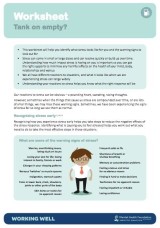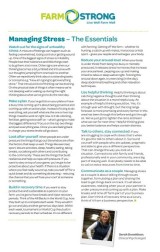If you're a frequent visitor to Healthify, why not share our site with a friend? Don't forget you can also browse Healthify without using your phone data.
Stress | Mate māharahara
Key points about stress
- Stress (mate māharahara) is your body’s natural reaction to a threat or an excess demand.
- Some stress is good for you and helps motivate you to get something done. But when you are under too much stress for too long, it affects your health and wellbeing.
- Learning how to manage stress is a key life skill.

Stress is our body’s natural reaction to a demand or threat. It triggers your body’s fight, freeze or flight response, which causes a surge of hormones that would have helped our ancestors to run away from the stressor or fight it. It is supposed to be a short, sharp response to danger. Experiencing stress regularly can have a negative impact on your health.
Stress can come from many sources such as health issues, relationship problems, work, financial issues, deadlines, exams or unrealistic expectations you put on yourself. What causes stress for you may not be stressful for someone else.
Some stress is helpful as it can motivate you to meet a deadline or get things done. But long-term stress can increase the risk of health conditions, such as:
- high blood pressure
- obesity and diabetes
- depression or anxiety
- heart disease
- muscle tension, headaches
- irritable bowel syndrome (IBS)
- suicide in extreme situations.
A stress-related condition called post-traumatic stress disorder (PTSD) can develop after experiencing trauma, such as from war, physical or sexual assault, or a natural disaster.
Video: Stress
(NHS Choices, UK, 2014)
Common symptoms caused by long-term stress include:
- headaches, muscle tension, neck or back pain
- dry mouth
- feeling anxious or jittery
- being more irritable or angry than normal
- overeating or loss of appetite and not eating well
- upset stomach
- chest pains, rapid heartbeat
- not sleeping
- feeling tired, flat, down or worn out
- finding it hard to concentrate or focus
- needing coffee, energy drinks or sugar to keep going
- increased skin infections, mouth ulcers, colds, rashes or asthma.
It helps to learn how to recognise stress and find ways to cope with it before your body's stress response fully kicks in.
Here are some ideas to help you get started:
- Include things you find relaxing in your everyday life, such as listening to music, mindfulness meditation, connecting with friends and regular exercise.
- Build real-life skills to manage stress by learning how to break down complex problems into manageable steps, practicing healthy communication, and challenging unhelpful thinking patterns.
- Maintain a healthy work-life balance, take frequent breaks and find other ways to manage stress at work.
- Take care of yourself by being physically active every day, eating a healthy diet, having good sleep habits
- Make time to do fun things and spend time with the people who are important to you.

Image credit: Canva
Because stress is a part of life, learning how to manage it is an important part of having good physical and mental health.
This involves learning to recognise what sparks stress in your daily life and having a grab-bag of anti-stress tools that you use regularly, ideally before your body's stress response fully kicks in. The key is to wind down before you get wound up. The more anti-stress tools you can learn the better – so get started today!
Video: Tips for managing stress
(Mind, UK, 2021)
Things to do
Here are some things that might help you manage your stress.
Exercise: Be active every day. Try walking, swimming, cycling, dancing or play a team sport – just find something you enjoy and keep doing it.
Sleep: Lack of good sleep can increase your stress levels. Learn about good sleep habits.
Eat well: A healthy diet rich in fresh fruit and vegetables and low in fatty, sugary and processed foods gives your body the nutrients it needs to help you manage your stress levels. There are also foods you can eat to boost your mood.
Self-care in daily tasks: Recognise that small daily tasks such as folding clothing, preparing food and cleaning are soothing self-care activities that tell your body and mind that you're safe.
Find a relaxing hobby: Take part in activities that calm you – such as gardening, painting, sewing, knitting, carving. Try different things to find what works best for you – then do it regularly!
Breathe deeply: You can relax and take in more oxygen if you breathe using your diaphragm. To practice diaphragmatic breathing:
- Put one hand on your chest and the other on your stomach.
- Breathe in deeply through your nose, making sure the hand on your stomach rises and the hand on your chest doesn't.
- Breathe out very slowly, then clench your abdomen muscles.
- Repeat these steps 4 times.
If you would like to find out more about healthy breathing, there are breathing therapists listed online or ask your healthcare provider.
Visualise yourself in a calm, relaxed place: Close your eyes and picture yourself in a calm, relaxing scene. such as lying on the beach. Keep imagining this for a few minutes or even just for a few seconds to help your body and mind unwind.
Practice mindfulness meditation: Mindfulness meditation is a technique to bring your focus into the moment and thereby escape some of the constant chatter of your brain. There are apps and online courses, and classes in some centres. Find out about some meditation and mindfulness apps reviewed by Healthify.
Do yoga, tai chi or other mindful-based movement: Yoga and other physical practices that encourage calm, mindful connection between body and mind have been found to reduce stress.
Massage, hypnotherapy and aromatherapy: These have all been shown to have some effect in reducing stress.
Listen to calming music: Listening to music you enjoy, particularly music that soothes you, can also calm your nervous system and help reduce your stress levels.
Shrug it off: Raise your shoulders, inhale, and then drop them and exhale. Do it 3 times.
Take a break: Give yourself a breather every now and then. take a short break during the day at work or at home to do something you really enjoy. Make sure you plan for a longer break or two over the year to relax more fully.
Connect with family/whānau and friends: Connecting with whānau and friends is a great way to get support when you need it. They can help you take a break from what you are stressing over and to work out whether it really is a problem.
Talk to someone: If you are finding the other stress tips aren’t enough for you to manage your stress, talk to someone you trust before it affects your health. Talking with a clergy member, kaumatua, counsellor or your healthcare provider can really help. You can find a counsellor, psychotherapist or psychologist(external link) yourself or ask your healthcare provider for a recommendation.
Learn skills that keep stress at bay: This includes self-assertion skills, such as being able to say ‘no’ when you need to. It also helps to learn to express anger in a constructive way and practice positive self-talk. Cognitive behavioural therapy is useful for developing these skills.
Get organised for and during work: Read about how to manage stress at work.
Get a pet: People with pets tend to feel calmer and less stressed – make sure you get one that’s compatible with you and your way of life though.
Write it down: Keep a notepad by the bed and write down what is on your mind before you go to sleep. Writing how you feel about situations that bother you can also help to reduce stress.
Digital detox: Taking regular breaks from screens and devices may help lower stress by reducing information overload and giving your mind a chance to rest. Stepping away from constant notifications and online demands makes it easier to unwind, sleep better, and focus on things that support your wellbeing.
Things not to do
Don’t use cigarettes, caffeine, alcohol or snack foods: These only make things worse in the long term, even if they appear to offer some kind of temporary relief
Don’t over-extend yourself: Instead, take one step at a time.
Don’t blame yourself if you don’t reach all your goals: Remember, these may be possible next time.
Video: What can you do to get through a crap week?
(Dr Mike Evans, Canada, 2015)
If you're finding it difficult to manage your stress, tell your healthcare provider or find a counsellor or therapist(external link) to talk to.
Te Hikuwai resources for wellbeing – stress/tāmitanga(external link) Te Pou, NZ, 2022
Manage your stress(external link) Small Steps, NZ
Stress(external link) Fresh Mind, NZ
Staying on track(external link) Just a Thought, NZ
Problem solving worksheet(external link) BC Partners for Mental Health and Addictions Information, CA
Online life skills resource(external link) Living Life to the Full, UK
Cognitive behaviour therapy (CBT) resources(external link) Get Self Help, UK
CALM – Computer Assisted Learning for the Mind(external link) A University of Auckland website with a range of tools to help you manage stress and develop greater happiness through developing mental resilience, managing stress, anxiety and depression, having healthy relationships and finding meaning in life.
Brochures
Stress and how to manage it(external link) Mental Health Foundation, NZ
Managing stress – the essentials(external link) Farmstrong, NZ, 2019
Managing stress – the warning signs(external link) Farmstrong, NZ, 2019
Signs of stress and mental health problems(external link) Farmstrong, NZ, 2018
Finding balance – Te whare tapa whā (Individual)(external link) Mental Health Foundation, NZ
Switching on your relaxation response(external link) Mental Health Foundation, NZ
Tank on empty?(external link) Mental Health Foundation, NZ
Note: These resources are from overseas so some details may be different in New Zealand, eg, phone 111 for emergencies or, if it’s not an emergency, freephone Healthline 0800 611 116.
Simple steps to calm your emotions(external link) This Way Up, New South Wales Multicultural Health Communication Service, Australia English(external link), Arabic(external link), Chinese (simplified)(external link), Chinese (traditional)(external link), Filipino(external link), Greek(external link), Hindi(external link), Italian(external link), Korean(external link), Spanish(external link), Vietnamese(external link)
Effective ways to express yourself(external link) This Way Up, New South Wales Multicultural Health Communication Service, Australia English(external link), Arabic(external link), Chinese (simplified)(external link), Chinese (traditional)(external link), Filipino(external link), Greek(external link), Hindi(external link), Italian(external link), Korean(external link), Spanish(external link), Vietnamese(external link)
Five helpful steps for tackling your problems(external link) This Way Up, New South Wales Multicultural Health Communication Service, Australia English(external link), Arabic(external link), Chinese (simplified)(external link), Chinese (traditional)(external link), Filipino(external link), Greek(external link), Hindi(external link), Italian(external link), Korean(external link), Spanish(external link), Vietnamese(external link)
Stress and stress management in multiple languages(external link) Health Translations, Australia
Apps/tools
Mental health and wellbeing apps
Self-management and healthy living apps
References
- Stress(external link) MedLine Plus, US, 2023
- Stress management(external link) Mayo Clinic, US, 2023
See our page stress for healthcare providers.
Brochures

Stress and how to manage it
Mental Health Foundation, NZ

Tank on empty?
Mental Health Foundation, NZ interactive worksheet available

Managing stress – the essentials
Farmstrong, NZ, 2019
Credits: Healthify editorial team. Healthify is brought to you by Health Navigator Charitable Trust.
Reviewed by: Dr Grace Lee, FRNZCGP and Clinical Educator
Last reviewed:





